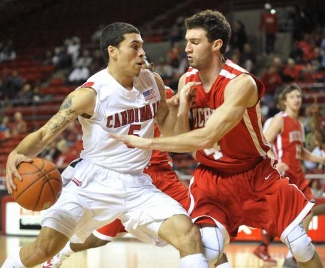Nicholls State Colonels (3-6) at Texas Longhorns (7-2)
Frank Erwin Center | Austin, TX | Tip: 7:15 P.M. | TV: Longhorn Network
LRT Consecutive Game #196
The Longhorns wrap up the cupcake portion of their non-conference schedule tonight, hosting the Nicholls State Colonels in what amounts to a glorified exhibition at the Frank Erwin Center. Tempo-free stat maven Ken Pomeroy has the Colonels ranked as the 21st-worst team in the country, even after they picked up their second Division I victory last night against Louisiana-Monroe.
The Longhorns have made vast improvements on the defensive side of the ball since their two losses in East Rutherford, holding their last five opponents to an effective field goal mark of just 37.4%. Of course, it should be noted that those five opponents currently have a combined record of just 20-23, with 10 of their wins coming against teams not in Division I. No matter how good Texas looks tonight against Nicholls State, fans must temper expectations, as the first true test of the team’s progress will come against Temple on Saturday.
By the numbers
Having lost leading scorer Anatoly Bose to graduation and the National Basketball League of his native Australia, the Colonels are working with four freshman, two transfers, and just one senior. Understandably, the Colonels were picked to finish dead last in the East Division of the Southland Conference by the league’s coaches.
As predicted, the on-court product has been quite sub-par so far this year. Nicholls State is averaging a per-possession point differential of -0.187, a discouraging number that is fueled by a terrible defense. The Colonels are the sixth-worst defense in the country according to Pomeroy, giving up 1.125 points per possession, thanks in large part to the 55% effective field goal percentage they are allowing opponents.
As it was on Saturday night against Texas State, tonight’s match-up on the glass is perfect for the Longhorns. Nicholls State is one of the ten worst offensive rebounding teams in the country, while Texas has struggled to stop opponents in that department for much of the season. Recently, the Longhorns have shown improvement, but again it is important to remember our earlier point regarding the level of competition over the last few games. Against this small, poor-rebounding team, the Longhorns should put up some video-game type numbers.
It is also worth noting that the Colonels have had some issues with ball control during their first nine games. The team’s turnover mark is a troubling 22.9%, a number that puts them in the bottom third of D-I teams. While Rick Barnes has never built the Texas offense on turnovers and transition, it’s still likely that the Horns will enjoy some fast break points courtesy of Nicholls State errors.
Meet the Colonels
As we mentioned, Nicholls State is truly in the midst of a rebuilding year. With Bose gone, 6’5″ senior Fred Hunter was supposed to carry the scoring load. Unfortunately, a knee injury from last year took longer than anticipated to heal, and Hunter elected to redshirt this season in the hopes of having a stronger senior campaign in 2012-13 with a more experienced squad.
The Colonels have a core rotation of nine players, but could go deeper down the bench against Texas, as they just played last night against Louisiana-Monroe. Injuries have forced Coach J.P. Piper to be very flexible with his lineups, meaning that eight different players have seen the starting five so far this season.

Ben Martin (right) is Nicholls State’s only active senior
(Photo credit: Valentino Mauricio/Beaumont Enterprise) |


